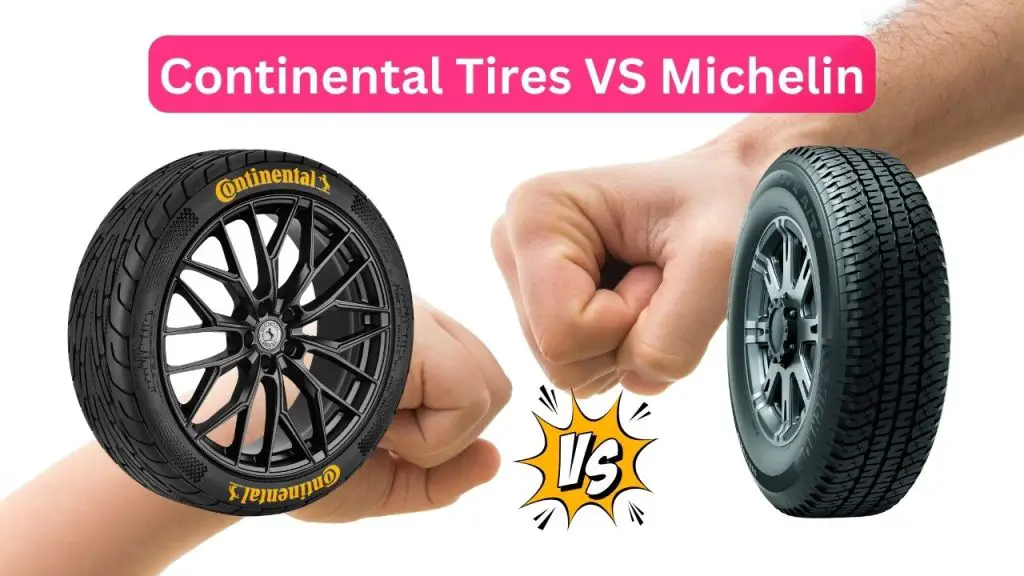Comparing Continental tires vs Michelin: Are Michelin tires superior? Get the facts and make an informed choice for your vehicle. Driving on a narrow mountain road emphasizes how crucial good tires are. In the tire business, Continental and Michelin are unique because they provide unmatched performance, safety, and innovation.
Selecting between these brands, whether for outdoor adventures or urban commuting, might be difficult. Both claim supremacy with advanced rubber compounds and cutting-edge tread designs. This article we are explores their distinctive features and benefits, guiding you to the best choice for your journey. We hope this tire comparisons blog will help you more.
Continental tires vs Michelin tires

Performance
1. Dry Performance
Both Continental and Michelin have established a solid reputation for dry performance among both casual and automotive aficionados. The secret to Continental’s success is their creative use of rubber compounds and tread patterns, which provide superb grip on dry roads and precise steering response. Due to its strict German technical standards, high-performance car owners who want dependability and agility frequently choose these tires.
On the other hand, Michelin elevates the dry performance game with unparalleled attention to detail in tire composition and structure. Utilizing advanced technologies such as EverGrip™ for consistent traction as the tire wears down, Michelin ensures a seamless blend of safety and exhilaration behind the wheel. The competition between these two giants is fierce; however, your final decision might hinge on subtleties like road feedback or cornering stability— nuanced factors where both brands excel but cater differently to diverse driving styles.
2. Wet Performance
When it comes to wet performance, both Continental and Michelin showcase distinct strengths that make them formidable contenders. Continental tires are renowned for their exceptional grip on waterlogged roads, thanks largely to their advanced tread design which efficiently displaces water to reduce hydroplaning risks. Their incorporation of cutting-edge silica compounds ensures heightened flexibility and traction under moist conditions, providing drivers with a confident ride even in torrential downpours.
On the other hand, Michelin places a strong emphasis on longevity coupled with wet performance, marrying durability with safety. The brand’s unique EverGrip technology is engineered to gradually expose new grooves as the tire wears down, maintaining strong wet-road adhesion over time. This innovation enables consistent handling and braking efficiency throughout the tire’s lifespan. By focusing not just on acute but also prolonged effectiveness in wet scenarios, Michelin offers an intriguing blend of sustainability and uncompromised road safety that appeals especially to long-term planners.
3. Winter Performance
When snow blankets the roads and temperatures plummet, the demands on your tires change dramatically. Continental excels in this arena with advanced silica compound technology that maintains flexibility even in bitter cold, ensuring optimal traction and control. The unique tread pattern of Continental’s winter tires offers excellent grip on icy surfaces, allowing drivers to navigate treacherous conditions confidently.
Conversely, Michelin’s winter performance excels with EverGrip technology, ensuring grooves expand as tires wear for continuous road-holding. Specialized rubber adapts to dry and snowy conditions, providing reliability. Continental uses silica blends and optimized surface grip.
Related: Goodyear Assurance VS Michelin Defender-Which Tire Better?
Related: All Season VS All Terrain Tires: Which is Better
Product Range
Michelin boasts a broad lineup catering to nearly all vehicle types including passenger cars, SUVs/4x4s, motorcycles, and light trucks. They offer specialized ranges for summer, winter, and all-season driving needs ensuring high quality across the board.
Continental also provides an extensive selection that spans various vehicle categories such as passenger cars, trucks, and commercial vehicles. Continental places a strong emphasis on developing tires suited for specific weather conditions—offering dedicated options for summer (inclined toward optimal performance), winter (focused on safety and grip under cold temperatures), and all-season (a balance between the two).
Durability & Longevity
Michelin tires are often highlighted for their longevity. The brand’s utilization of high-end materials contributes to tires that not just perform excellently but also last long thereby offering value over time despite a higher initial cost.
Continental produces durable tires that excel particularly in tread life expectancy which can be attributed to the company’s investment in tire compound technologies. However, perceptions of longevity may vary based on model and usage patterns; overall they hold up well against industry standards.
Technology & Innovation
Michelin continually innovates with initiatives like the Michelin Total Performance concept which underscores their commitment to enhancing every aspect of tire design – from safety to longevity without compromising on performance aspects.
Continental places a significant emphasis on safety innovations including their ContiSense and ContiAdapt tech which aim at increasing road safety through monitoring tire condition in real-time and adjusting tire characteristics automatically according to road conditions respectively.
Price
Both brands position themselves at the premium end of the market due to their quality guarantees.
Michelin tends towards slightly higher pricing reflective of its market reputation for longevity and fuel efficiency gains.
Continental while also premium-priced offers value through competitive pricing particularly within certain product lines favorable from a cost-performance perspective.
Conclusion
Both Michelin and Continental are titans within the tire industry renowned for their unwavering commitment to safety, innovation, and quality. Choosing between them often comes down to specific needs regarding performance preferences or budget constraints.
Both brands have offerings that cater comprehensively across various segments ensuring consumers get what’s best aligned with individual requirements whether prioritizing longevity, performance under extreme conditions or seeking a balance between cost-effectiveness without sacrificing quality.
Are Michelin tires better than Continental?
Both Michelin and Continental offer high-quality tires. Michelin is often praised for longevity and comfort, while Continental excels in grip and safety features. The best choice depends on your specific driving needs such as weather conditions, driving style, and vehicle type. Consider reading reviews of specific models to make an informed decision.
The Next Road (thenextroad.com) is an affiliate of the Amazon Services LLC Associates Program, so you can access the Amazon marketplace when on this domain. We will earn a commission from your qualified purchases.